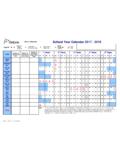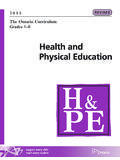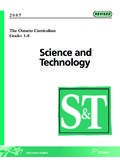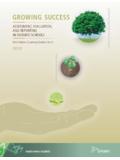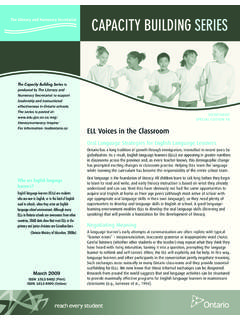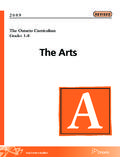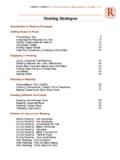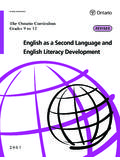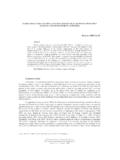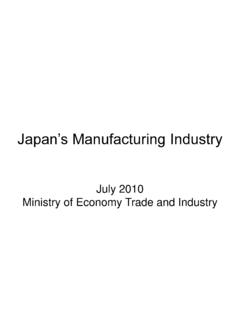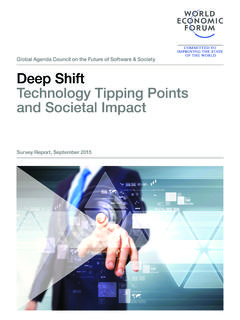Transcription of The Ontario Curriculum, Grades 11 and 12: Technological ...
1 TechnologicalEducationREVISEDT echnologicalEducationTheOntarioCurriculu mGrades11and122009 REVISEDINTRODUCTION5 Secondary Schools for the Twenty-first Century ..5 The Importance of Technological Education in the Curriculum ..5 The Goals of Technological Education ..6 The Philosophy of Broad-Based Technological Education ..7 Fundamental Technological Concepts ..7 Roles and Responsibilities in Technological Education ..8 THE PROGRAM IN Technological EDUCATION 11 Overview of the Program ..11 Curriculum Expectations ..18 Strands in the Technological Education Curriculum ..19 Problem Solving in Technological Education ..21 ASSESSMENT AND EVALUATION OF STUDENT ACHIEVEMENT24 Basic Considerations ..24 The Achievement Chart for Technological Education ..26 Evaluation and Reporting of Student Achievement ..30 Reporting on Demonstrated Learning Skills ..30 SOME CONSIDERATIONS FOR PROGRAM PLANNING31 Instructional Approaches.
2 31 Health and Safety in Technological Education ..32 The Ontario Skills Passport and Essential Skills ..33 The Role of Information and Communications Technology in Technological Education ..34 Planning Technological Education Programs for Students With Special Education Needs ..34 Program Considerations for English Language Learners ..37 Antidiscrimination Education in Technological Education ..39 Environmental Education in Technological Education ..41 Literacy, Mathematical Literacy, and Inquiry/Research Skills ..42 Career Education ..42 CONTENTSUne publication quivalente est disponible en fran ais sous le titre suivant :Le curriculum de l Ontario , 11eet 12eann e ducation technologique, publication is available on the Ministry of Education s website, at Education and Other Forms of Experiential Learning ..43 Planning Program Pathways and Programs Leading to a Specialist High Skills Major ..44 COURSESCOMMUNICATIONS TECHNOLOGY 47 Overview.
3 47 Communications Technology, Grade 11,University/College Preparation ( TGJ3M) ..48 Communications Technology: Broadcast and Print Production, Grade 11,Open ( TGJ3O) ..56 Communications Technology, Grade 12,University/College Preparation ( TGJ4M) ..62 Communications Technology: Digital Imagery and Web Design, Grade 12,Open ( TGJ4O) ..69 COMPUTER TECHNOLOGY 75 Overview ..75 Computer Engineering Technology, Grade 11,University/College Preparation ( TEJ3M) ..76 Computer Technology, Grade 11,Workplace Preparation ( TEJ3E) ..83 Computer Engineering Technology, Grade 12,University/College Preparation ( TEJ4M) ..89 Computer Technology, Grade 12,Workplace Preparation ( TEJ4E) ..96 CONSTRUCTION TECHNOLOGY103 Overview ..103 Construction Engineering Technology, Grade 11,College Preparation ( TCJ3C) ..104 Construction Technology, Grade 11,Workplace Preparation ( TCJ3E) ..112 Custom Woodworking, Grade 11,Workplace Preparation ( TWJ3E).
4 120 Construction Engineering Technology, Grade 12,College Preparation ( TCJ4C) ..127 Construction Technology, Grade 12,Workplace Preparation ( TCJ4E) ..135 Custom Woodworking, Grade 12,Workplace Preparation ( TWJ4E) ..1443 GREEN INDUSTRIES153 Overview ..153 Green Industries, Grade 11,University/College Preparation ( THJ3M) ..154 Green Industries, Grade 11,Workplace Preparation ( THJ3E) ..162 Green Industries, Grade 12,University/College Preparation ( THJ4M) ..169 Green Industries, Grade 12,Workplace Preparation ( THJ4E) ..177 HAIRSTYLING AND AESTHETICS185 Overview ..185 Hairstyling and Aesthetics, Grade 11,Workplace Preparation ( TXJ3E) ..186 Hairstyling and Aesthetics, Grade 12,Workplace Preparation ( TXJ4E) ..193 HEALTH CARE201 Overview ..201 Health Care, Grade 11,University/College Preparation ( TPJ3M) ..202 Health Care, Grade 11,College Preparation ( TPJ3C) ..209 Health Care, Grade 12,University/College Preparation ( TPJ4M).
5 216 Health Care, Grade 12,College Preparation ( TPJ4C) ..224 Child Development and Gerontology, Grade 12,College Preparation ( TOJ4C) ..232 Health Care: Support Services, Grade 12,Workplace Preparation ( TPJ4E) ..239 HOSPITALITY AND TOURISM247 Overview ..247 Hospitality and Tourism, Grade 11,College Preparation ( TFJ3C) ..248 Hospitality and Tourism, Grade 11,Workplace Preparation ( TFJ3E) ..256 Hospitality and Tourism, Grade 12,College Preparation ( TFJ4C) ..262 Hospitality and Tourism, Grade 12,Workplace Preparation ( TFJ4E) ..270 MANUFACTURING TECHNOLOGY279 Overview ..279 Manufacturing Engineering Technology, Grade 11,University/College Preparation ( TMJ3M) ..280 Manufacturing Technology, Grade 11,College Preparation ( TMJ3C) ..288 Manufacturing Technology, Grade 11,Workplace Preparation ( TMJ3E) ..296 Manufacturing Engineering Technology, Grade 12,University/College Preparation ( TMJ4M) ..304 Manufacturing Technology, Grade 12,College Preparation ( TMJ4C).
6 312 Manufacturing Technology, Grade 12,Workplace Preparation ( TMJ4E) ..320 Technological DESIGN327 Overview ..327 Technological Design, Grade 11,University/College Preparation ( TDJ3M) ..328 Technological Design and the Environment, Grade 11,Open ( TDJ3O) ..334 Technological Design, Grade 12,University/College Preparation ( TDJ4M) ..341 Technological Design in the Twenty-first Century, Grade 12,Open ( TDJ4O) ..348 TRANSPORTATION TECHNOLOGY355 Overview ..355 Transportation Technology, Grade 11,College Preparation ( TTJ3C) ..356 Transportation Technology: Vehicle Ownership, Grade 11,Open ( TTJ3O) ..363 Transportation Technology, Grade 12,College Preparation ( TTJ4C) ..372 Transportation Technology: Vehicle Maintenance, Grade 12,Workplace Preparation ( TTJ4E) ..3794 This document replaces all but the Computer and Information Science component of TheOntario Curriculum, Grades 11 and 12: Technological Education, 2000.
7 Beginning in September2009, all Technological education courses for Grades 11 and 12 will be based on the expecta-tions outlined in this document. SECONDARY SCHOOLS FOR THE TWENTY-FIRST CENTURY The goal of Ontario secondary schools is to support high-quality learning while givingindividual students the opportunity to choose programs that suit their skills and updated Ontario curriculum, in combination with a broader range of learningoptions outside traditional classroom instruction, will enable students to better customizetheir high school education and improve their prospects for success in school and in life. THE IMPORTANCE OF Technological EDUCATION IN THE CURRICULUM Technological innovation influences all areas of life, from the daily lives of individuals to the work of business and government, to interactions on a global scale. It helps meetbasic human needs and provides tools for improving people s lives and exploring newfrontiers.
8 The policy outlined in this document is designed to ensure that technologicaleducation in Ontario enables students to meet the challenges and opportunities of thetwenty-first century. The power, reach, and rapid evolution of technology demand a curriculum that will enablestudents to become technologically literate that is, able to understand, work with, andbenefit from a range of technologies. Students need to acquire the Technological skills andknowledge that will allow them to participate fully in a competitive global economy and tobecome responsible citizens in an environmentally vulnerable world. To succeed in today ssociety, students need to be effective problem solvers and critical thinkers, able to under-stand, question, and respond to the implications of Technological innovation. Students whopursue careers in technology will also need these high-level skills to develop solutions totechnological challenges or to provide the services required in their chosen fields.
9 Technological education focuses on developing students ability to work creatively andcompetently with technologies that are central to their lives. As they proceed throughtheir elementary and secondary school education, students attain a level of technologicalliteracy that will enhance their ability to succeed in their postsecondary studies or in theworkplace. For students who do not choose to pursue careers in technology, technologicaleducation can provide knowledge and skills that will enhance their daily lives, whetherby enabling them to work on home renovations or car repairs or by allowing them to pur-sue Technological Ontario CURRICULUM, Grades 11 AND 12| Technological Education6 Technological education promotes the integration of learning across subject disciplines. For example, when students design a product, they explore the social or human need thatthe product addresses (social science), the scientific principles involved in its design andconstruction (science), its dimensions and shape (mathematics), and the aesthetic qualitiesof its design (the arts).
10 When they assess the impact that new technologies have had ormay have on society, students are exploring historical or current events. When they con-sider how various technologies affect health and physical well-being, they are looking intoaspects of health and physical education. Students apply business principles to the study of the production and marketing of products. They apply literacy skills to communicatedesign ideas, produce reports summarizing Technological projects, and write instructionsfor the use of the products they create. Technological education also helps students developresearch skills and fosters creativity, critical thinking, and problem solving. In addition, inits emphasis on innovation to meet human needs, it encourages global citizenship and pro-motes social, economic, and environmental awareness. Subject matter from any course in Technological education can be combined with subjectmatter from one or more courses in other disciplines to create an interdisciplinary policies and procedures regarding the development of interdisciplinary courses are outlined in the interdisciplinary studies curriculum policy document.
